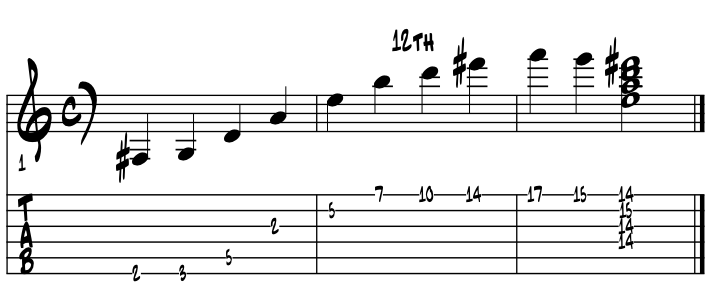In a nutshell. Our perfect 12th interval turns out to be the same pitch as our perfect fifth, Five, just moved up one full octave. And in near all things Americana music theory, whereby we strive to simply keep it simple, just don't ever recall coming across a musical element or component that was numerically described to contain or feature a perfect 12th, it's always just the perfect 5th. |
Even in voicings where the 5th is indeed up an additional octave from its root pitch, it's still termed to be the fifth of the chord. There must be a 12th somewhere, just have yet to find it :) Does there have to be a reason for everything ? |
The perfect 12th. We're back to 12 again, twelve also being the number of pitches in our equal tempered, chromatic scale. Our perfect twelfth interval is simply an octave plus a perfect fifth above any chosen root pitch. That the 5th plays a colossal role in most of the Americana sounds we love, that makes it noteworthy. |
Please examine and compare the pitches and sounds of our perfect 5th and its transposition up one full octave to our perfect 12th interval. Example 1. |
|
 |
Easy enough yes? Cool. Oh and ... |
The upper pedal tone / dominant. A pedal tone is simply a sustained pitch for a couple of measures or say a four bar phrase, an eight bar section, a 12 bar blues etc. As the dominant note in a key, Five and now even Twelve, can be a very cool pedal tone. With its sounding in the mix we can foretell a tonal / key center direction to the music, or not as the case might be. Pedal tones can rather quickly generate a great sense of anticipation and excitement of the music. |
While not at all uncommon today in various pop 'synth' musics, when combined with the 'crushed or press roll' on the snare, jazz and blues players have another potent combination to create aural direction their work, i.e., something's cooking stay tuned. Examine the two most common dominant pedal positions; lower and upper pedals, determined by their position in the mix. Thinking 'C' major. Example 2. |
 |
Sound like an intro to a song? Cool. That's some lower pedal magic setting expectations up. We can place it anywhere in our arrangements. So, with turnarounds? Moving between sections? Absolutely to both. |
Upper dominant pedal in action. Very much the same as the last idea just flipped and adjusted for clarity. Thinking 'C' major. Example 2a. |
 |
In this last idea we hear a common way that many improvisors might start off on a solo, the sounding an upper pedal dominant tone to begin. |
Wide interval ideas. I once heard and beheld of this magic decades ago now and pass it along here. For there's a way to create melodic lines with what players might generally call wide interval lines. Wide intervals are those that span a fourth or more. So even though we have gone way beyond the fourth here, we can create ideas that go up to our biggest intervals. Like a 12th? Yep. |
So this next idea gets us from one end of the instrument to the other in a couple of beats. Rather tricky on the stringed instruments, mostly just looking to open up new ground here for those so inclined to explore on their own. Thinking in G major here, our pitch 'D' is a 12th above the root. Example 3. |
 |
This type of expansion really knows no bounds. Any reshaping of pitches of this line up or down the octave is in play here. Patterns of intervals mixed in with chord tones and depending on the harmony at the moment, are easy ways into these sorts of melodic lines. |
Review and forward. The interval of a perfect 12th is simply enlarging the interval of the perfect 5th and moving it up one octave. Rarely if ever named a 12th in the literature, we theorists tend to be thorough and want to know about and explore the nooks and crannies of our musical universe. For in doing so, we just never know what might shake loose and provide a creative spark for something new, something exciting or ... just another silly love song. |
"They who conquer others are strong ... those who conquer themselves are mighty." |
wiki ~ Lao tzu |
 |
 |
|||||||||||
 |
 |
 |
 |
 |
 |
 |
 |
 |
 |
 |
 |
 |
References. References for this page's information comes from school, books and the bandstand and made way easier by the folks along the way. |
Find a mentor / e-book / academia Alaska. Always good to have a mentor when learning about things new to us. And with music and its magics, nice to have a friend or two ask questions and collaborate with. Seek and ye shall find. Local high schools, libraries, friends and family, musicians in your home town ... just ask around, someone will know someone who knows someone about music and can help you with your studies in the musical arts. |
|
Always keep in mind that all along life's journey there will be folks to help us and also folks we can help ... for we are not in this endeavor alone :) The now ancient natural truth is that we each are responsible for our own education. Positive answer this always 'to live by' question; 'who is responsible for your education ... ? |
Intensive tutoring. Luckily for musical artists like us, the learning dip of the 'covid years' can vanish quickly with intensive tutoring. For all disciplines; including all the sciences and the 'hands on' trade schools, that with tutoring, learning blossoms to 'catch us up.' In music ? The 'theory' of making musical art is built with just the 12 unique pitches, so easy to master with mentorship. And in 'practice ?' Luckily old school, the foundation that 'all responsibility for self betterment is ours alone.' Which in music, and same for all the arts, means to do what we really love to do ... to make music :) |
 |
"These books, and your capacity to understand them, are just the same in all places. Always bear in mind that your own resolution to succeed, is more important than any other one thing." |
|
Academia references of Alaska. And when you need university level answers to your questions and musings, and especially if you are considering a career in music and looking to continue your formal studies, begin to e-reach out to the Alaska University Music Campus communities and begin a dialogue with some of Alaska's finest resident maestros ! |
|
~ |











